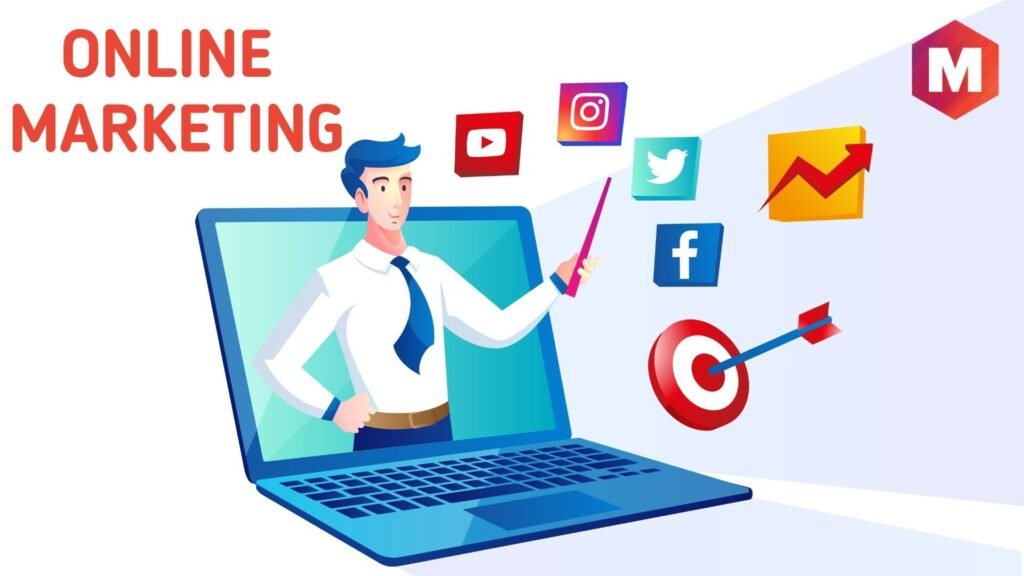Online marketing introduction
Online marketing is the use of digital platforms and technologies to promote and sell products or services. Unlike traditional marketing methods that rely on print, broadcast, and direct mail, online marketing utilizes the internet and electronic devices to connect with customers. It encompasses a wide range of strategies and tactics aimed at increasing visibility, driving traffic, and generating leads or sales.
Online Marketing
Online marketing, also known as digital marketing, refers to the use of digital channels and technologies to promote and sell products or services. It encompasses a broad range of strategies and tactics designed to reach, engage, and convert potential customers through various online platforms. Here’s a detailed description
Understand Your Audience
online marketing Research your target audience to understand their demographics, interests, behaviors, and online habits. Develop detailed buyer personas to tailor your marketing efforts effectively.

Choose Your Channels
Select the digital channels that best suit your goals:
- Website: Optimize for user experience and SEO.
- Social Media: Use platforms like Facebook, Instagram, Twitter, LinkedIn, and TikTok for engagement.
- Email Marketing: Build and manage an email list for targeted communications .
- Search Engine Marketing (SEM): Utilize paid ads like Google Ads to appear in search results,for example rosaliemarketing
- Content Marketing: Create valuable content such as blogs, videos, infographics, or podcasts.
- Affiliate Marketing: Partner with other businesses or individuals to promote your products or services,(https://rosaliemarketing.com/)

Social Media Marketing
This involves using social media platforms like Facebook, Instagram, Twitter, LinkedIn, and TikTok to promote your brand, engage with users, and drive traffic to your website. Social media marketing helps build brand awareness, foster community, and drive engagement through regular posts, paid ads, and influencer collaborations.
Content Marketing
Content marketing focuses on creating and sharing valuable, relevant, and consistent content to attract and engage your target audience. This can include blog posts, articles, videos, infographics, and whitepapers. The aim is to provide information that solves problems and builds trust with your audience.
Develop a Strategy
Create a content plan outlining what you’ll produce, how often, and where you’ll post. Decide on your advertising budget and platforms. Formulate an SEO strategy to improve your website’s search engine ranking.
Create Engaging Content
Produce high-quality visuals and relevant information that addresses your audience’s needs. Use clear Call-to-Actions (CTAs) to encourage specific actions, like signing up for a newsletter or making a purchase.(https://rosaliemarketing.com/)
Implement and Monitor
Launch your marketing campaigns and use analytics tools to track performance. Analyze data to see what’s working and what’s not, and adjust your strategies accordingly.
Analyze and Optimize
Regularly review metrics to understand the effectiveness of your efforts. Make necessary adjustments based on performance data and feedback. Test different approaches to find what resonates best with your audience.
Stay Updated
Keep up with the latest industry trends and changes in online marketing. Engage in continuous learning through webinars, courses, and industry news to stay ahead.(https://rosaliemarketing.com/)
Tools to Consider
- Google Analytics: For tracking website traffic and user behavior.
- SEMrush or Ahrefs: For SEO and keyword research.
- Hootsuite or Buffer: For social media management.
- Mailchimp or Constant Contact: For email marketing.
By following these guidelines and regularly evaluating your approach, you can develop a successful online marketing strategy tailored to your business needs. If you have any specific questions or need further details, feel free to ask us (https://rosaliemarketing.com/)
